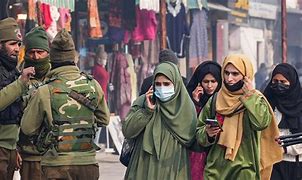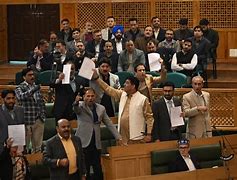
“Article 370 Boycott: जम्मू और कश्मीर नेता Central Government के खिलाफ एकजुट”
Article 370 Boycott:
-
- Political Discontent: Many local leaders feel that the revocation of Article 370 in August 2019 was unjust and undermined the region’s autonomy. They believe that the central government’s actions were taken without proper consultation with the local population or their representatives.
- Demand for Restoration: By boycotting discussions, these leaders aim to emphasize their demand for the restoration of Article 370 and the special status that Jammu and Kashmir previously held. They want to highlight the importance of this issue to their constituents.
- Unity Among Leaders: The boycott can also be seen as a show of unity among various political parties in Jammu and Kashmir, signaling that they collectively oppose the changes made by the central government and are standing together for their rights.
- Public Sentiment: Many leaders are responding to the sentiments of their constituents, who may feel marginalized or unheard since the revocation. By boycotting, they aim to represent the voices of the people who are affected by these changes.

Here are some key reasons why Jammu and Kashmir leaders are boycotting discussions related to Article 370 Boycott:
-
- Loss of Autonomy: Leaders believe that the revocation of Article 370 stripped Jammu and Kashmir of its special status and autonomy, which was crucial for the region’s identity and governance.
- Lack of Consultation: Many local leaders feel that the decision was taken without proper consultation with them or the people of Jammu and Kashmir, leading to feelings of disenfranchisement.
- Political Solidarity: By boycotting, leaders aim to show a united front against the central government’s actions, emphasizing that they collectively oppose the changes made.
- Public Sentiment: The boycott reflects the concerns of the local population, who may feel that their voices are not being heard in the political process since the revocation.

To address the issues surrounding the boycott of discussions related to Article 370, several approaches could be considered:
-
- Dialogue and Consultation: The central government could initiate open dialogues with local leaders and stakeholders in Jammu and Kashmir. This would involve listening to their concerns and involving them in discussions about governance and autonomy, which could help rebuild trust.
- Restoration of Autonomy: Exploring options to restore certain aspects of autonomy that were lost with the revocation of Article 370 could be a way to address the leaders’ grievances. This might include granting more powers to local governance and ensuring that the region’s unique identity is respected.
- Engagement with the Public: Conducting public consultations and forums where the local population can voice their opinions and concerns can help ensure that their voices are heard. This could lead to more inclusive decision-making processes.
- Confidence-Building Measures: Implementing measures that promote peace and stability in the region, such as economic development initiatives, job creation, and improved infrastructure, could help alleviate some of the tensions and foster a more positive relationship between the central government and the people of Jammu and Kashmir.
By adopting these strategies, it may be possible to ease the political tensions and foster a more collaborative environment for addressing the concerns of Jammu and Kashmir leaders and their constituents.
The Modi government is against the Jammu and Kashmir government regarding Article 370 for several reasons:
-
- Revocation of Article 370: The Modi government decided to revoke Article 370 to integrate Jammu and Kashmir more closely with the rest of India. Their aim was to ensure uniform laws and governance across the region.
- Terrorism and Security Concerns: The government believes that Article 370 contributed to the rise of terrorism and separatism in Jammu and Kashmir. They argue that removing this article would improve the security situation in the region.
- Development and Investment: The Modi government feels that the removal of Article 370 will open up new opportunities for development and investment in Jammu and Kashmir, thereby improving the local economy.
- National Integration: The government’s aim is to achieve better integration of Jammu and Kashmir with the rest of the country. The removal of Article 370 is seen as a step toward this goal.stand out with us
For more upadates…
